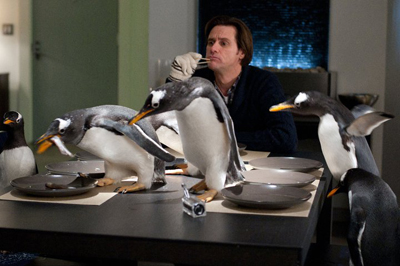|
|
Book Vs. Movie: Mr. Popper's PenguinsBy Russ BickerstaffJune 22, 2011
In calling to attempt to get the penguin returned to his late father’s ship, there’s something of a mix-up and he ends up getting a shipment of a few more penguins. At that stage, the film begins to resemble to book less and less. The penguins stand between the two ends of Popper’s life. On the one hand, he’s trying to buy the ultra-impossible-to-purchase Tavern on the Green restaurant. On the other end of things, he’s trying to get back in touch with his family. The two are at odds with each other and the penguins are somewhere in the middle of it all. With his kids so completely in love with the penguins, his initial desire to get rid of them changes. The zoologist who he contacted to try to take them away becomes a weakly comic villain. Of course, making the zoologist the villain of the film keeps its heart solidly removed from that of the book. The plot of the film values the importance of human connection—family connection and suchlike. The book has its heart firmly entrenched in a love of nature. The family-centric theme of the film would be a lot more convincing if the human end of the film was at least marginally convincing. Yes, Carrey is only mildly annoying here, but the whole family dynamic plays out in a kind of desperation that never quite feels convincing enough to be real. The single most genuine-feeling emotional moment of the film isn’t human, though - it is entirely fabricated. It’s less than a minute’s worth of film, but there’s a point where Popper is on the couch watching a nature program, mulling over what to do with the penguin he has just received. The penguin in question is watching the show. There’s a tender moment there where there’s a bird in flight seen on the TV screen. The penguin looks down at her wings, raises and lowers them, and then looks back up at the footage of the bird in flight longingly. There’s real subtlety here that’s really quite touching. And the beauty of the subtlety of watching a semi-anthropomorphized penguin longing to fly is brilliantly executed. That moment and the penguin’s love of Chaplin films are the only couple of moments where the film really manages to bring across some of the charm the penguins possess in the book. The Verdict The book came at a time before penguins had become commonplace in popular culture. They were a novelty, which allowed the book a kind of charming novelty not capable in an era where penguins have already been the subject of a couple of wildly successful films. The film adaptation actually does a pretty good job of finding a level of realism somewhere between March of the Penguins and Happy Feet, but the novelty just isn’t there. And in a summer overpopulated by kid’s films, it’s not going to be remembered all that well. It is likely to break even on production budget, but opening the same week as a huge, corporate kids' superhero marketing piece and just before the massive machinery of a huge Disney/Pixar sequel, any hopes of success beyond that simply are NOT realistic. The book is likely to maintain a kind of timelessness that will see the film being kind of an odd footnote to the book’s longevity. In ten years, one imagines someone reading the book to their kids and saying, "you know, they made a movie based on this book a long time ago…"
[ View other columns by Russ Bickerstaff ]
[ View other Book vs. Movie columns ]
[ Email this column ]
|

|
|
|

|
Friday, May 3, 2024
© 2024 Box Office Prophets, a division of One Of Us, Inc.


